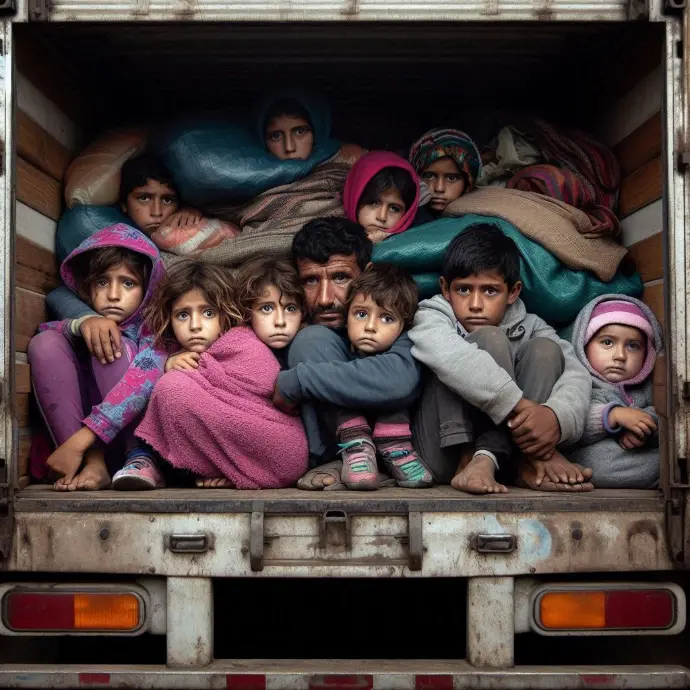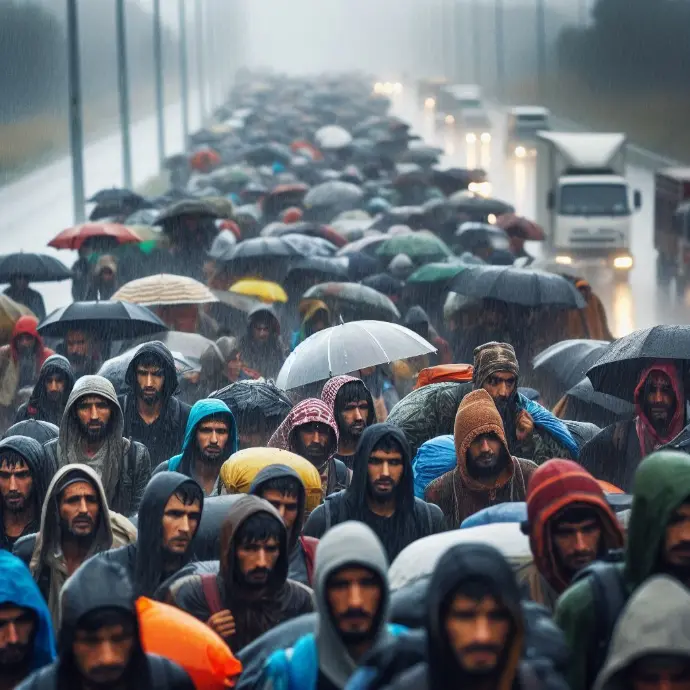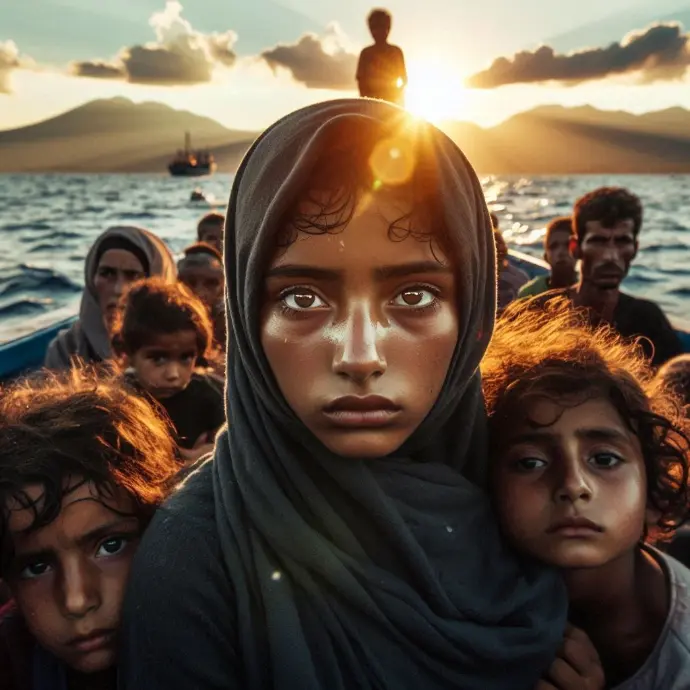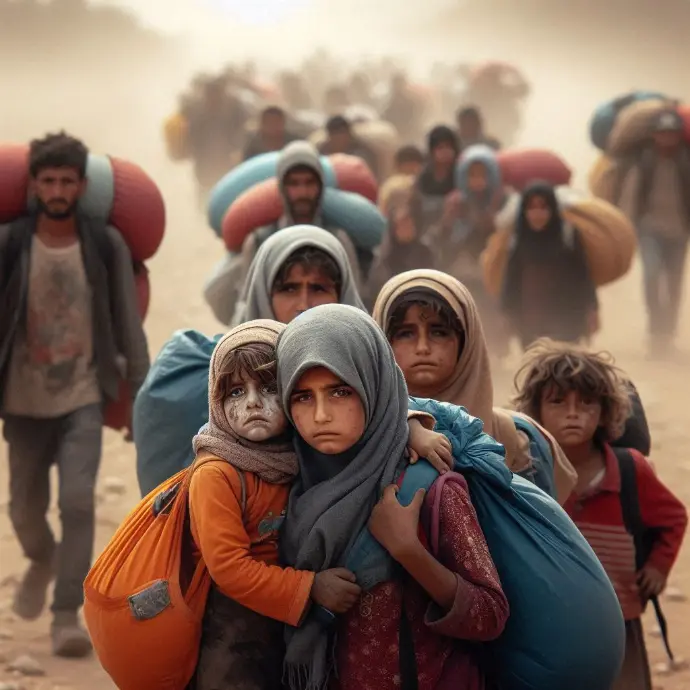
Human Rights and Migration: Facing the Crisis with Humanity and Justice
In this article "Human Rights and Migration: Facing the Crisis with Humanity and Justice", we will explore in depth the complex situation of migration from a human rights perspective.
Join us on this journey of discovery and analysis, where we will unravel the complexities of this crucial issue. We invite you to immerse yourself in a world of reflection and information that will challenge your perspective. Find out more about the humanitarian crisis and migration, and join the fight for a more just and inclusive world!
Introduction
Migration is a global phenomenon that affects millions of people around the world. Recognizing the importance of human rights in the context of migration is crucial, as people on the move face a range of challenges and vulnerabilities. Ensuring that migrants’ human rights are respected and protected is essential to effectively address the complex realities of migration.
The human rights of migrants encompass fundamental aspects such as the right to life, liberty, personal security, work, education and health care. It is also essential to recognize and respect the inherent dignity of every individual, regardless of their migration status. Ensuring that these rights are respected contributes to creating more inclusive and fair societies for all, regardless of their origin or migration status.
In the context of migration, human rights also entail access to fair and equitable asylum procedures, as well as protection from human trafficking and labour exploitation. The promotion and protection of migrants' human rights contributes to building more cohesive communities that respect diversity.
The humanitarian crisis has a significant impact on migration globally. Armed conflicts, natural disasters, extreme poverty and lack of economic opportunities are just some of the factors that drive people to leave their places of origin in search of safety and a better life. This crisis has generated massive migration flows, challenging host countries and creating situations of vulnerability for migrants.
It is important to understand that forced migration as a result of humanitarian crises can exacerbate already existing human rights challenges. Migrants fleeing conflict or natural disasters face additional risks, such as violence, discrimination and lack of access to decent living conditions. The humanitarian crisis not only affects countries of origin, but also puts pressure on host countries, highlighting the need for a coordinated and supportive humanitarian response at a global level.
The impact of the humanitarian crisis on global migration underscores the importance of addressing the underlying causes of forced migration and ensuring the protection of migrants' human rights at all stages of their journey, from displacement to integration into new environments.
Forced migration poses significant challenges in terms of justice and the protection of human rights. It is essential to adopt an approach to justice that recognises the specific needs and vulnerabilities of forced migrants, ensuring that they have access to legal remedies and fair and equitable asylum procedures. Justice in the context of forced migration involves respect for the principles of non-refoulement, which guarantee that no person is expelled or returned to a country where their life or freedom is at risk.
Furthermore, justice in situations of forced migration also involves accountability for those responsible for human rights violations against migrants. This includes impartial investigations, effective prosecution and reparations for victims. It is also necessary to address the conditions of detention of migrants, ensuring that their fundamental rights are respected and their well-being is promoted during the migration process.
Ultimately, a justice approach in situations of forced migration seeks to ensure that migrants are treated with dignity and respect, and that they have the opportunity to rebuild their lives in safe and welcoming environments. This requires a global commitment to protecting the human rights of all migrants, regardless of their immigration or legal status.
Context of migration and human rights
Forced migration refers to the displacement of people due to armed conflict, persecution, human rights violations or natural disasters. This situation has profound implications for human rights, as people who are forced to migrate often face serious risks to their safety, physical integrity and general well-being. Furthermore, forced migration entails additional challenges in terms of access to humanitarian assistance, health services, education and employment, which directly impacts the exercise of their fundamental rights.
In the context of forced migration, specific challenges are faced with regard to the protection of human rights. The vulnerability of forced migrants requires special attention to ensure that their fundamental rights are respected and protected, regardless of their migration status. The international community recognizes the importance of addressing this issue in a comprehensive manner that respects human rights principles.
It is essential to understand that forced migration not only impacts at the individual level, but also has consequences at the community and societal level. Addressing this issue from a human rights perspective is therefore essential to ensure an appropriate and empathetic response to this situation.
Forced migration is defined as the displacement of people due to armed conflict, persecution, human rights violations or natural disasters. This situation has profound implications for human rights, as people who are forced to migrate often face serious risks to their safety, physical integrity and general well-being. Furthermore, forced migration entails additional challenges in terms of access to humanitarian assistance, health services, education and employment, which directly impacts the exercise of their fundamental rights.
Forced migration not only involves challenges at the individual level, but also has consequences at the community and societal level. Therefore, addressing this issue from a human rights perspective is essential to ensure an adequate and empathetic response to this situation.
In this regard, it is essential that international legislation recognizes and protects the rights of forced migrants, establishing clear standards for their protection and ensuring that they have access to effective mechanisms to enforce their rights in host countries.
International law recognises the importance of addressing forced migration from a human rights perspective. The 1951 Convention relating to the Status of Refugees and its 1967 Protocol establish the legal framework for the protection of persons forced to leave their countries due to well-founded fears of persecution. The Universal Declaration of Human Rights and other international instruments also enshrine the fundamental rights of all persons, regardless of their migration status.
It is crucial that States fulfil their human rights obligations, ensuring that national legislation is aligned with international standards and that effective measures are taken to protect and respect the rights of forced migrants. In addition, it is necessary to promote international cooperation to address forced migration in a comprehensive manner that respects human rights principles.
International law on migration and human rights establishes a robust legal framework to ensure the protection of the fundamental rights of forced migrants. However, it is essential that this framework be translated into concrete actions at national and international levels to ensure that the rights of these people are respected and protected at all stages of their migration journey.
In situations of migration crisis, there are specific challenges in protecting the human rights of forced migrants. Lack of resources, saturation of reception systems and xenophobia can contribute to violating the fundamental rights of these people, exposing them to situations of risk and discrimination.
Furthermore, the lack of coordination between the different actors involved in managing the migration crisis can hinder the provision of humanitarian assistance and the guarantee of the rights of forced migrants. It is essential that States, international organizations and civil society work together and in a coordinated manner to ensure an effective response that respects human rights in situations of migration crisis.
The protection of human rights in situations of migration crisis requires a comprehensive approach that ranges from the provision of humanitarian assistance to guaranteeing access to effective mechanisms for protection and respect for fundamental rights. Only through a coordinated approach based on human rights principles will it be possible to address the migration crisis with humanity and justice, ensuring that the rights of forced migrants are recognized and protected at all times.
The relationship between migration, human rights and humanitarian crises is complex and multifaceted. Migration, whether forced or voluntary, poses significant human rights challenges, as migrants may face discrimination, lack of access to basic services, and violations of their fundamental rights. In the context of a humanitarian crisis, such as armed conflict, natural disasters or situations of extreme poverty, the vulnerability of migrants is exacerbated, requiring urgent and coordinated responses to protect their rights and dignity.
Human rights, in the context of migration, require states and institutions to respect the principle of non-refoulement, which prohibits the return of persons to countries where their lives or freedoms are at risk. Migrants also have the right to fair and humane treatment, access to fair and effective asylum procedures, protection from human trafficking and labour exploitation, and guarantees that their families are reunited in the event of separation due to migration. Humanitarian crises often test the capacity of states and the international community to meet these standards and protect the rights of migrants in emergency situations.
Addressing crises with humanity and justice involves addressing the underlying causes of forced migration, protecting migrants in transit and at destination, and ensuring that their human rights are respected at all times. This requires a comprehensive approach that combines short-term responses to address the immediate needs of migrants in crisis, with long-term strategies that address the structural inequalities, lack of opportunities and conflicts that drive forced migration in the first place.
Human Rights in Migration: Approaches and Perspectives
Migration is a complex phenomenon that particularly affects different groups of the population, including women. A gender approach to migration is essential to understand and address the human rights violations faced by migrant women. Migrant women are exposed to a range of risks, including gender-based violence, labour exploitation and family separation. It is crucial to analyse how these experiences impact their human rights, and how migration policies can promote their protection and well-being.
In addition, it is important to consider the impact of migration on communities of origin, where women may assume leadership roles and family responsibility due to the absence of migrant men. This can influence their economic, social and cultural rights, as well as their access to justice and resources for community development.
A gender approach to migration is therefore essential to ensure that migration-related policies and programmes respect and protect the human rights of migrant women and their communities of origin.
Child migration poses unique challenges in terms of the protection of children's human rights. Migrant children face specific risks, such as separation from their families, exposure to violence, abuse and exploitation, as well as lack of access to education and adequate health services.
It is crucial to ensure that the rights of migrant children are respected and protected at all stages of the migration process, from their departure to their arrival in the destination country. This involves developing policies and programmes that address the specific needs of migrant children, providing them with comprehensive protection, care and support.
Furthermore, it is essential to promote international cooperation to address child migration in a comprehensive manner, recognising that it is a transnational phenomenon that requires coordinated and coherent responses in terms of human rights and child protection.
Access to justice is a crucial element in the protection of migrants' human rights. However, migrants often face significant barriers to accessing justice, including legal, language, cultural and economic obstacles. This can leave migrants vulnerable to labour exploitation, discrimination and violence.
It is essential to promote access to justice for migrants, ensuring that they have the opportunity to defend their rights on equal terms with the rest of the population. This involves providing legal advice, interpretation services, free legal representation and specialised care to address the specific needs of migrants in the justice system.
Furthermore, it is necessary to develop policies and mechanisms that protect migrants from retaliation for seeking access to justice, and that sanction those who violate their rights in the migration context. Access to justice is a fundamental pillar to guarantee the effective protection of the human rights of all migrants, regardless of their migration status or personal situation.
Migration management is a crucial issue in the context of global human rights, especially in the midst of migration crises. It is essential to address this challenge from an ethical and humanitarian perspective, recognizing the dignity and fundamental rights of all people, regardless of their migration status. Ethics involves ensuring that migration-related policies and actions are based on principles of justice, equity and respect for cultural diversity, avoiding discrimination and stigmatization of migrants.
Humanity in migration management involves recognizing the situations of vulnerability and risks faced by migrants, especially those fleeing persecution, violence or extreme poverty. It is essential to offer international protection to those in need, ensuring that their human rights are respected at all stages of the migration process. Likewise, humanity involves promoting the integration of migrants into host societies, facilitating their access to basic services, decent employment and development opportunities, thus contributing to the construction of more inclusive and cohesive communities.
In this sense, ethics and humanity in migration management are not only fundamental principles from a moral perspective, but are also key to ensuring stability, peace and sustainable development at a global level. Addressing the migration crisis with these values in mind is essential to building a world that is more just, equitable and respectful of the human rights of all people, regardless of their origin or nationality.
Current and future challenges in the protection of migrants’ human rights
The global humanitarian crisis has had a significant impact on the protection of the human rights of migrants, who face both legal and practical challenges in trying to secure their fundamental rights. The lack of clear and effective policies, as well as discrimination and xenophobia, have exacerbated migrants’ vulnerability and jeopardized their overall well-being.
The current situation raises a number of concerns in relation to the protection of migrants’ human rights, including access to justice, security, and protection from exploitation and abuse. Furthermore, the lack of coordination between countries and international organizations has hindered the implementation of effective measures to address this humanitarian crisis in a comprehensive manner.
With the continued increase in migration globally, it is crucial to address these challenges proactively and collaboratively, ensuring that the human rights of all migrants are respected and protected, regardless of their migration status or personal situation.
Migration poses a number of legal and practical challenges in ensuring the human rights of migrants. At the legal level, the lack of a clear and coherent regulatory framework at the international and national levels has created gaps in the protection of migrants’ rights, leaving them vulnerable to violations of their fundamental rights.
In addition, practical challenges, such as lack of access to basic services, discrimination in the workplace, and exposure to exploitation and abuse, have created significant barriers to the full realization of migrants’ human rights. These challenges are exacerbated in the context of a humanitarian crisis, where the capacity of states and organizations to address the needs of migrants is overwhelmed.
It is essential to address these challenges in a comprehensive manner, implementing policies and practices that ensure the protection of migrants’ human rights at all stages of their migration journey, from their departure from their country of origin to their arrival and integration in the country of destination.
In humanitarian crises, migrants face a range of risks and vulnerabilities that jeopardize their safety and well-being. Lack of access to food, shelter and adequate health care, coupled with exposure to violence, exploitation and abuse, creates an extremely challenging environment for migrants seeking a better life.
Furthermore, restrictive migration policies and rising xenophobia have contributed to the marginalization and exclusion of migrants, further hampering their ability to access necessary resources and protection in times of crisis. This combination of factors has exacerbated migrants’ vulnerability and jeopardized their ability to exercise their human rights fully and effectively.
It is critical to adopt a human rights-based approach to addressing the risks and vulnerabilities of migrants in humanitarian crises, ensuring that their fundamental rights are respected and protected at all times, regardless of their migration status or personal situation.
Actions and measures to address the migration crisis with humanity and justice
The implementation of human rights-based policies for migration management is essential to ensure that the fundamental rights of migrants are respected at all stages of the process. This involves the creation and enforcement of laws and regulations that protect the rights of migrants, regardless of their legal status. Policies must address the specific needs of vulnerable groups, such as women and children, and must be aligned with international human rights treaties.
In addition, it is essential that these policies promote the social and labour integration of migrants, fostering cohesion and mutual respect between host communities and newcomers. The effective implementation of human rights-based policies requires constant monitoring and accountability, as well as the active participation of civil society and human rights organisations.
The implementation of human rights-based policies for migration management is crucial to ensure that migrants are treated humanely and fairly, regardless of their origin or status.
International and regional cooperation plays a key role in protecting the human rights of migrants, as the challenges associated with migration transcend national borders. Collaboration between countries of origin, transit and destination is essential to address the underlying causes of migration, ensure the safety and well-being of migrants during their journey, and facilitate their integration into host societies.
This cooperation can take the form of bilateral or multilateral agreements that establish common standards for the treatment of migrants, the prevention of human trafficking and the protection of labour rights. Cooperation on the exchange of information and good practices can also contribute to more effective migration management, in line with human rights principles.
Ultimately, international and regional cooperation in protecting the human rights of migrants is an essential component of addressing the migration crisis with humanity and justice, promoting solidarity and mutual respect among nations.
Humanitarian interventions play a crucial role in the protection of human rights in the context of migration. In situations of humanitarian crisis, such as natural disasters, armed conflicts or health emergencies, it is essential to ensure that migrants receive adequate humanitarian assistance, without discrimination and with full respect for their dignity and fundamental rights.
These interventions may include the provision of shelter, food, medical care, legal advice and psychosocial support to migrants, with a particular focus on the most vulnerable groups. It is also crucial that humanitarian interventions are aligned with the principles of neutrality, impartiality and independence, and that they have the active participation of local communities and civil society organisations.
Humanitarian interventions play a significant role in the protection of human rights in migration, providing vital assistance to those in situations of extreme vulnerability, and contributing to addressing the migration crisis with humanity and justice.
Conclusions
Migration management at a global level has faced numerous challenges in recent decades, and it is crucial to focus on creating policies that address migration in a more humane and fair way. This involves not only considering security and laws, but also the well-being and human rights of migrants. It is essential to work on building systems that guarantee the protection and dignity of those who are forced to leave their homes in search of a better life.
To move towards more humane and fair migration management, it is essential that governments and international organizations collaborate closely, recognizing the complexity and interconnected nature of migration at a global level. International cooperation, information sharing and common policies will play a fundamental role in promoting a more equitable and respectful approach to migration.
In addition, it is important to consider the specific needs of vulnerable groups, such as women, children, and ensure that migration policies effectively protect their rights. Including diverse voices in policymaking will play a crucial role in creating more equitable and humane systems for migration globally.
In the context of the global migration crisis, the protection of human rights plays a fundamental role in promoting humanity and justice. Migrants, regardless of their legal status, have inherent rights that must be respected and protected at all times. This includes access to healthcare, education, housing and fair and safe working conditions.
The global migration crisis has highlighted the urgent need to address the underlying causes of forced migration, such as violence, poverty and climate change. Only through a comprehensive approach that effectively addresses these issues can progress be made towards sustainable solutions that protect the human rights of all individuals, regardless of their origin or migration status.
It is also crucial that States comply with their international human rights obligations, ensuring that migration policies are aligned with the principles of non-discrimination, equality and human dignity. The effective implementation of human rights protection mechanisms, both at the national and international levels, will be essential to address the migration crisis with humanity and justice.
While the migration crisis presents significant challenges, it also provides opportunities to promote humanity and justice in the context of migration. The mobilization of civil society, non-governmental organizations and human rights defenders in support of migrants plays a crucial role in promoting a more humane and fair approach to migration at the global level.
The creation of spaces for dialogue and collaboration between different actors, including States, international organizations, civil society and the private sector, offers an opportunity to develop innovative approaches that integrate human rights protection into migration policies and practices. The exchange of good practices and lessons learned at the international level can contribute to the formulation of more effective and human rights-respecting policies.
Promoting awareness and education on human rights and migration can also play a key role in transforming attitudes and perceptions towards migrants. By fostering a greater understanding of the realities and challenges faced by migrants, greater empathy and solidarity can be fostered globally, laying the groundwork for a more humane and fair approach to migration in the future.

 IHRO NEWS
IHRO NEWS

